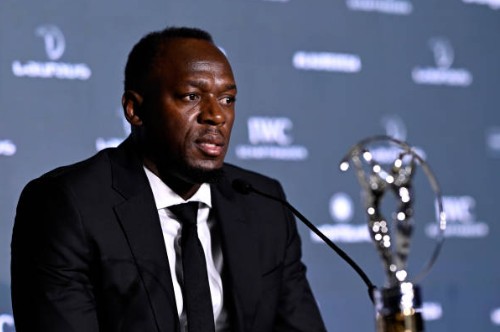
The world knows Usain Bolt as the smiling superstar — the lightning bolt, the showman, and the fastest man to ever grace the track. For over a decade, he stood as the face of athletics, a symbol of joy, confidence, and domination. But in a recent emotional interview, years after his retirement, the Jamaican sprint legend finally revealed a side of himself that fans rarely get to see — one marked by pain, struggle, and regret.
With tears streaming down his face, Bolt admitted, “I can’t hide it anymore… please forgive me.” Those words stunned the world. For a man who once seemed invincible, this confession carried a weight that resonated deeply. The eight-time Olympic gold medalist, who brought pride and laughter to millions, opened up about the emotional toll that retirement and fame had taken on his life. “People see the medals, the celebrations, the world records,” he said softly, “but they don’t see what happens when the lights go off.”
After his final race in 2017, Bolt stepped away from the sport that defined his life. Many assumed he would easily transition into the next chapter — business ventures, family life, endorsements, and an endless legacy. But behind the scenes, he faced battles no stopwatch could measure. Losing the rhythm of daily training, the adrenaline of competition, and the roar of the crowd left a void that no success could fill. “I thought I was ready to retire,” he confessed, “but I wasn’t ready to lose the feeling of being out there — the feeling of flying.”
His honesty struck a chord with fans and athletes worldwide. Social media flooded with messages of love and encouragement. Many called Bolt’s words “a brave act,” praising him for shattering the silence around the mental struggles athletes face after leaving the spotlight. Even legends, it seems, can be haunted by the ghosts of their greatness.
The interview also revealed the depth of Bolt’s humility. He spoke of moments when he felt disconnected from his identity — the man who was once larger than life suddenly faced the quiet reality of normal days. “I miss the people. I miss hearing Jamaica chant my name. But most of all, I miss believing that I could make the world stop for 9.58 seconds.”
Yet amid the heartbreak, there was hope. Bolt’s vulnerability became a powerful reminder that strength isn’t just about winning races; it’s about facing the truth within yourself. His message to fans was clear: “No matter how fast you are, you can’t outrun pain — but you can face it, heal from it, and keep moving forward.”
As the interview ended, Bolt smiled faintly through his tears, thanking everyone who still believes in him. “I gave the world my speed,” he said, “but now I just want to live in peace.”
The moment was raw, real, and unforgettable — proof that even the fastest man alive is, at heart, profoundly human. 🏃♂️💫💔
Be the first to comment